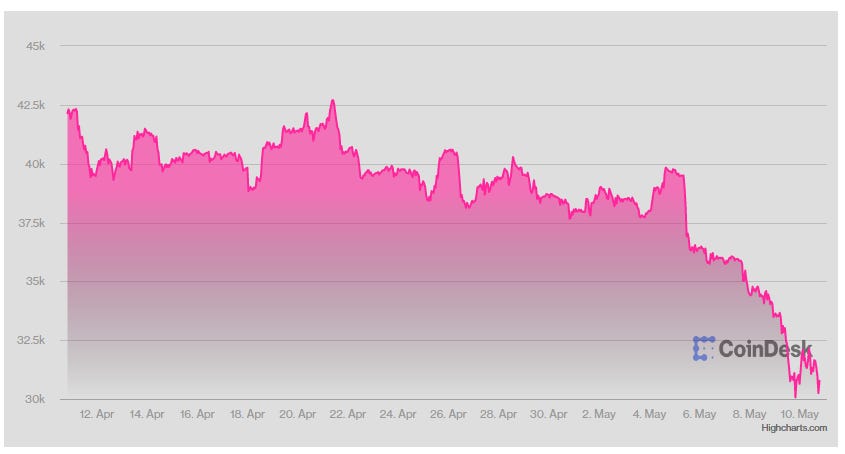Charlie Munger Is Right: China Is Making The U.S. "Look Foolish" On Bitcoin
Months ago I wrote that China could be banning crypto to sidestep a global financial cataclysm. With crypto markets in turmoil & Charlie Munger sharing my sentiments, it's time to revisit the idea.
Just a couple months after I started my blog, and well before all hell started breaking loose in terms of Ukraine, inflation, and the market generally taking a shit - at the very height of what could only be described as a feverish risk-on environment - I wrote an article called “Is China Sidestepping A Crypto Cataclysm That No One Sees Coming?”
The article speculated as to whether or not China’s banning of bitcoin was a prescient move designed to avert financial meltdown contagion from spreading to the country in the event of a crypto crash.
At the time, the article was mostly laughed at, especially because reality had not yet hit markets and I was alone, for the most part, in trying to disrupt a euphoric consensus.
But it now seems like a great time to revisit those predictions, not only because it appears that the United States is on the verge of recession, but also because of statements made by Charlie Munger at Berkshire Hathaway’s recent annual meeting.
A couple of days ago, I was seeking the advice of somebody in their late 60s about issues unrelated to finance. After they took the time to give me their thoughts, they followed it up by assuring me that “with age comes a priceless wisdom that there is no substitute for”.
Twenty years ago - heck, even ten years ago - I might’ve heard this and thought to myself: “What a crock of bullshit!”. In fact, I’m certain that’s the first thought that comes to mind for a lot of “investors” in crypto - many of whom are in their late teens, twenties and early thirties.
But, at the ripe old age of 40, it’s starting to make a whole hell of a lot of sense to me, as I’m guessing it does for many people as they, themselves, start to become older.
With that in mind, it was funny to see one of the world’s most legendary investors, 98 year old Charlie Munger, simply be written off by the crypto community for his thoughts on the space. It’s the age old conflict of whether or not he’s just too damn old to understand and simply doesn’t get it or - more likely - whether he is doling out wisdom that those younger than him simply cannot fathom because they haven’t matured enough to understand it.
At Berkshire Hathaway’s annual meeting a couple days ago, Munger held his skeptical stance on crypto, which he has eloquently referred to as a “venereal disease” in the past. Among his general skepticism, one statement I found interesting was Munger’s assertion that China was ahead of the game for banning it. Munger said:
“In my life, I try and avoid things that are stupid and evil and make me look bad in comparison to somebody else – and bitcoin does all three. In the first place, it’s stupid because it’s still likely to go to zero. It’s evil because it undermines the Federal Reserve System ... and third, it makes us look foolish compared to the Communist leader in China. He was smart enough to ban bitcoin in China.”
Today’s article is free, but if you enjoy the content, would like to support my work and have the means, I’d be humbled to have you as a subscriber:
In my previous article about China and bitcoin, I speculated:
But the one unthinkable scenario that no one wants to consider and that no one is discussing is how China could be making an exceptionally prescient move: sidestepping a coming global economic crash that could happen at the hands of the crypto market, which earlier this year was worth more than $2 trillion.
In an interview I had with Palisades Gold Radio earlier this week, I made several prognostications regarding China while making the case that crypto, if it suddenly went “no bid” could be much more of a “Lehman moment” than Evergrande could ever be (see above).
The first was my belief that crypto is, by far and away, the most precarious section of the global economy at this point and that it has the highest chance of causing another global financial crisis that could be too big to print ourselves out of.
The second prognostication was my long-standing belief that China is taking a lengthy, calculated road to try and make itself the sole global superpower. This road includes a number of complex steps, instituted over long periods of time, like backing their coming digital Yuan with gold in order to eventually challenge the dollar as the world reserve currency.
I then went a little Alex Jones, exploring different scenarios that could wind up causing maximum pain for the U.S., putting China in a position of more leverage economically than its ever been:
If China sees a crypto cataclysm coming - or even worse, somehow has some type of control over orchestrating it – it could be another brick in the wall of the country’s plan to usurp economic power globally.
If they are simply trying to protect the digital Yuan or are just being cautious, crypto still remains one of the largest potential outstanding bubbles that could bring the global system to its knees.
Regardless of how such a crisis would be catalyzed, if China isn’t actively involved in the crypto space during a collapse of the “asset class”, the country could be positioned to come out of a crisis in far better shape than other major superpowers that have adopted the asset class, like we are doing in the United States.
The unthinkable scenario is a $2 trillion plus bubble going up in flames overnight. If we did try to print our way out of such a crisis and China didn’t have to take strenuous monetary stimulus measures while the rest of the world did, how would that be reflected in the strength of their currency versus the dollar? Further, how would it be reflected if China decides to back its currency with gold at the same time?
Obviously, Munger’s statement resonated with me, and likely resonated with more people than it would have six months ago. This is, of course, because we are in the middle of a massive pullback in risk assets, which I have noted in the past, bitcoin most certainly is.
People who may have laughed Munger off while bitcoin was at all time highs may be more inclined to lend their ear to what he has to say now. Put simply, the environment for risk tolerance has changed.
And even if the personal risk tolerance for some younger investors hasn’t changed (i.e. they simply ‘don’t get’ that they are wrong because they have attended the Ross Gerber/Cathie Wood School Of Investing), forced liquidations make additional risk taking impossible. Margin calls make up your mind for you: you’re fucking wrong.
Oh, and by the way, have I mentioned that there aren’t going to be any more PPP loans or additional unemployment benefits, like there were all through 2020 and 2021?
In other words, the risk takers may still want to take risk, but they simply can’t. One way or another, this could lead to a hard reset of how they think about crypto.
I was happy to see Munger land on the point I brought up months ago.
I don’t see it as a sleight to the U.S. at all, but I simply believe China to be far more cutthroat and shrewd when it comes to protecting their economy, trade and business in general.
If the country saw a potential trillion dollar disaster coming down the pipe with regard to crypto, or even if they just didn’t want it around because they don’t want competition for the renminbi, banning it from the country was the right move.
Take a look at the markets today, versus 6 months ago, and tell me they might not actually be on the precipice of sidestepping a blowup that the U.S. could have far more exposure to.
This, of course, would fall in line with my long held thesis that China wants to back its digital currency with gold, that they are interested in bifurcating the global economy, likely with Russia, and that they eventually want to challenge the dollar.
If the market crash hasn’t been enough of a sign for people to pay attention to risk assets – specifically cryptocurrencies – perhaps the century old wisdom of Charlie Munger and his compatriot Warren Buffett may start to register.
It doesn’t matter whether people get the message about China from me or from Munger, the important thing is that they consider that figurative other side of the “coin” at a crucial juncture where people should be reassessing the risk that they are taking - from both a bearish and a bullish perspective.
Again, as I was told the other day:
“With age comes a priceless wisdom that there is no substitute for.”
Disclaimer: I own small speculative positions in bitcoin, Ethereum and ETFs and stocks with ties to crypto (i.e. SI, etc.). This is not a recommendation to buy or sell any stocks or securities. I own or may own all crypto/names I mentioned or linked to in this piece. I often lose money on positions I trade/invest in. I may add any name mentioned in this article and sell any name mentioned in this piece at any time, without further warning. None of this is a solicitation to buy or sell securities. These positions can change immediately as soon as I publish this, with or without notice. You are on your own. Do not make decisions based on my blog. I exist on the fringe. The publisher does not guarantee the accuracy or completeness of the information provided in this page. These are not the opinions of any of my employers, partners, or associates. I get shit wrong a lot.







“It’s evil because it undermines the Federal Reserve System…”. The system that creates the inflation that destroys the middle class? The system that funds every awful and misguided war we get into? I guess that’s the only thing Bitcoin has going for it.
I don’t own any crypto and I mostly agree, but I took issue with that idiotic part of the statement.
China didn't ban crypto because of some prescient knowledge of the danger it may present to their economy. They banned it because they saw it as a challenge to the control of their people and afraid of the power and potential it would hold. Bitcoin is decentralized while the Chinese government holds it's power through centralization. It makes no sense they would ban crypto to protect their economy while allowing something far more devastating like Evergrande to flourish in their country. The Chinese have a history of banning or destroying technologies that could upset the power dynamic of the ruling class. More than 500 years ago the Chinese had the strongest and largest navy in the world. They could have easily conquered the world. However, the merchant class started to gain vast wealth and influence that the emperor at the time saw as a danger to his hold on power. The emperor had their vast and powerful navy destroyed to protect his control. Trade routes were demolished, their maps were burned, their ships were destroyed and sunk. China's ban on crypto also coincided with the crackdown on people like Jack Ma. It is all because of fear of losing political control.